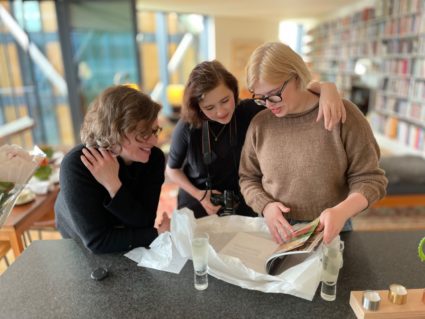home again home again

I know, I know, I am really provincial and not very sophisticated, but it just boggles my mind that I can be saying goodbye to Anne and David in Connecticut one minute, and seemingly literally just minutes later be descending my London front steps on the way to Marks and Spencer for groceries. People do this all the time, I know! But it takes a long time for me to re-acclimate. I feel for several days as if all the beloved people on both sides of the pond are residing in my pockets, or sitting on my shoulders, some wanting to know why I’ve left and others not realizing I’ve ever been gone. “Why, you know on Tuesday…” No, I wasn’t here on Tuesday! “Over the weekend we…” Well, we were somewhere else! And to think of our beloved Red Gate Farm fireplaces dead and dark, our barns unlighted, the pond empty of our skating attempts, Rollie roofing the barn without us there to gloat, the snow melting over our footprints. I hate that! And yet, to come home to London and see that our cats are thriving, the oven still working for a roast chicken, “Top Gear” ready to be watched: that’s all to the good as well. It does make me laugh to hear Jeremy Clarkson say that the “right turn on a red light” is the only significant contribution of American culture to the world. Thanks, Jeremy. I’ll be sure and log the invention of potted chicken under YOUR nation’s cultural achievements. Harumph.
I am totally inspired now, after our afternoon with Anne across the road, to begin work in earnest on my edition of her grandmother’s recipes. Over a lovely lunch of oyster stew, we discussed strategies for choosing, presenting and updating Gladys’s recipes. There are some lovely bits, like “scalloped oysters,” or “sweet potato souffle,” absolute marvels of simplicity and thrift. Then there are classic budget-conscious postwar gems like “Sour Cream Loaf” which features ground veal and chopped green peppers (an ingredient for which I feel a totally irrational hostility), as well as the eponymous dairy product. That’s got to be a really weird dish. Then there’s the recipe for lobster bisque, which involves mixing a can of mushroom soup and a can of tomato soup, and a “No.1 can of lobster”. Now, I don’t know what a No.1 can is, but I feel certain that no can should contain lobster.
Here’s one fascinating thing about recipes from the past, I find: there is a curious contradiction about seasonality, and also affordability, that pervades many of the instructions. On the one hand, old-fashioned cookery writers are much more tolerant of simply not being able to get things at certain times of the year (like fruit in snowy Connecticut), or not being able to afford things (like a lobster fresh from the ocean). However, they are perfectly happy to use frozen strawberries, something I have never purchased, or canned cherries, or canned lobster. If I can’t have it fresh (whether from availability or from cost), I just skip it. What does that mean about me as a cook, and about Gladys? I have a lot to think about, before I can put together a decent analysis of the cookery mood of one New Englander writer in the 1940s, and my own 21st century urban attitude, in this era when one can get (if one can afford) almost anything, almost anytime of the year. I am incredibly flattered that Anne thinks I am the right person to take on her beloved famous relative’s work, and turn it into something that new readers can approach with enthusiasm. Most important, I think, is to point out that Martha Stewart did not invent domesticity, nor did Nigella Lawson, as wonderful as these people are. And there is a great deal to be said for a writer, and a person, who wanted her writing and her recipes to be accessible, not to scare people to death.
Anne feels that the best thing to do is to select a small number of good recipes, and test them all, possibly bring them up to date with modern ingredients, and surround them with some sort of text that will get across the enormous and lasting appeal of Gladys’s writing. That is a tall order, on all sides. Because the recipes are really only the tip of her appeal. Of course that is in part because the collections are peppered with items like this gem: “Boiled Tongue: raisin sauce makes a nice change.” I bet it does. No, the recipes are lovely, some delicious, and all of them evocative of a certain era in homemaking, but her real genius is in her genuine love for her farm, her friends, family, hospitality and enjoyment of her rural life. And I must say her concern for the overdevelopment of the surrounding countryside resonates awfully loudly today. So I must put on my thinking cap and do her justice. In the meantime, you should give her writing a whirl. I can only hope to produce anything half so valuable, but I’ll try.


